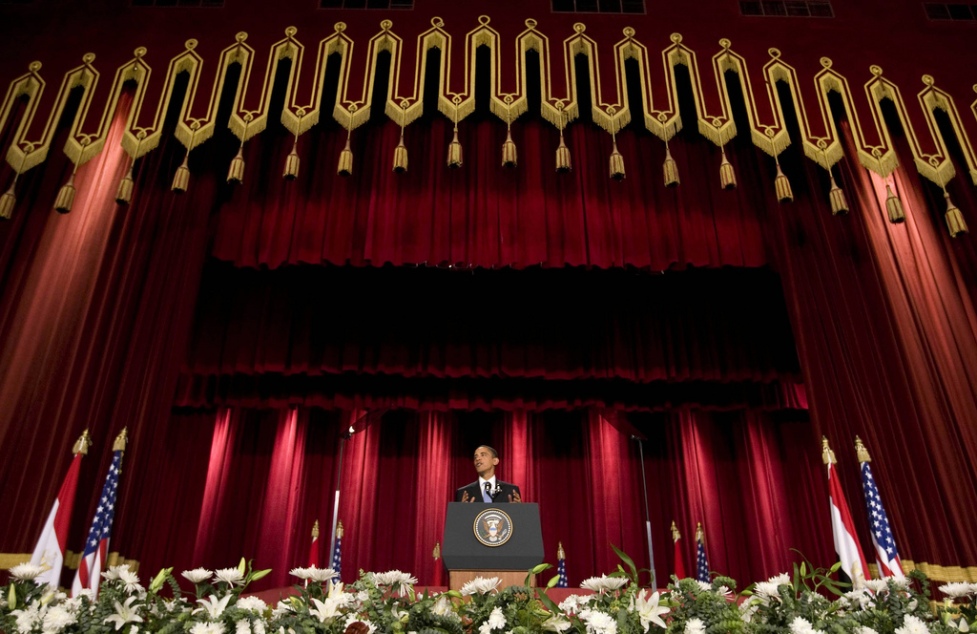Obama proposed a bold, fresh take on Middle East relations back in 2009 — has he delivered?
By Wilfred M. McClay
It is always difficult to play the prophet, particularly when one is a historian by training and temperament, and when one conspicuously lacks the ability to read other people’s minds, either as individuals or as groups. In addition, given the complex web of issues that influence Americans’ voting behavior, and given the diversity of constituencies making up the American electorate, it is exceedingly hard to disentangle one issue, or one thread of issues, and isolate it from the rest. And events are always overtaking our projections, as has been vividly illustrated by the recent attacks on American diplomatic facilities and personnel in Libya, attacks that are almost certainly filtering into the consciousness of voters and affecting their decisions, although in ways that are still unfolding.
Of course, one needs to bear in mind that the most important issue in the fall elections is the struggling American economy, which has yet to emerge from the 2007-2008 financial crisis and recession. If Obama loses the election, as now seems very possible, the economic and fiscal issues—high unemployment, anemically low growth, and staggering indebtedness—will be the principal source of his defeat. But foreign policy issues also loom large for many American voters, and Obama’s policies in the Middle East, which are now seen by all but his most passionate defenders as having failed, certainly do not give him anything to boast about as Election Day approaches.
As in so many aspects of the Obama Administration, there has been a steep descent from lofty and ambitious heights. Obama’s Cairo speech of June 4, 2009, entitled “A New Beginning,” provided a statesmanlike overview of a fresh approach to the entire Muslim world, one that rebuked and renounced the forceful interventionism of the Bush administration and promised a more “evenhanded” approach to intractable Middle Eastern issues. This development in itself was attractive to many Americans, who were by then weary of wars in Iraq and Afghanistan and eager for more harmonious relations with the Muslim world. Some were uncomfortable with the sight of an American president criticizing his country, and the policies of his predecessor, on foreign soil. But those were in a decided minority. Americans were enthusiastic about a new beginning for American policy in the region.
But much of that initial support would fade when the vision began to be translated into particular actions and inactions. When it became clear that the Administration would be passive in the face of the Iranian regime’s brutal crackdown on the “Green movement” that arose in the wake of a fraudulent presidential election, and would fail to offer a vigorous counter to the Iranians’ steady development of a nuclear-weapons capability, many Americans began to question where Obama’s policies were leading. When the Administration used the issue of apartment construction in East Jerusalem to condemn Israel’s controversial settlement policy, and try thereby to demonstrate to the Muslim world that there was indeed “light” between American policy and Israeli policy, it was forced to back down in humiliation. This not only earned it the distrust of Israelis and Muslims alike, but also of the American Jewish community, one of the most important constituencies of Obama’s Democratic party, as well as other groups staunchly committed to Israeli security, such as evangelical Christians, many of whom had enthusiastically supported Obama’s election in 2008.
In addition, some of the more forceful actions of the Administration, such as the “surge” of troops in Afghanistan, the killing of Osama bin Laden, and the extensive use of unmanned drones in Afghanistan and Pakistan to kill suspected terrorists, seemed incongruous and out of character with the Cairo vision. Liberal supporters of Obama were dismayed that he did not substantially change the security and counterterrorism measures imposed by the Bush administration, and in some cases, such as the National Defense Authorization Act of 2012, extended them to allow the indefinite detention of without charge or trial of American citizens.
Obama insisted that the enemy being fought was Al-Qaeda and its allied terrorist groups, and that a strategy focused on them was fully compatible with his outreach to the Muslim world. Indeed, that strategy was in the process of being vindicated by the fact that Al-Qaeda, stripped of its charismatic leader bin Laden, had been largely defeated. Or so it seemed. But the terrorist attack in Benghazi on September 11, 2012, killing the American ambassador to Libya and three others, rendered that contention implausible. In addition, the movement of the Egyptian government toward domination by Islamists, along with other governments in the region, suggested that the Arab Spring might be eventuating in the establishment of governments distinctly unfriendly to the United States and its ally Israel. As the election approaches, Obama finds himself in a genuine quandary, distrusted or disliked by nearly all parties involved.
All these factors are playing a role in depressing electoral support for Obama, even among as hardcore a traditionally Democratic group as American Jews. In the end, in the eyes of the general public the problem is one of ineffectuality. Obama offered a bold, even audacious vision of a transformation of America’s Middle Eastern relationships. He has failed to deliver on that vision, and the American public is likely to hold him to account for it.
Wilfred M. McClay is the SunTrust Chair of Excellence in Humanities at the University of Tennessee at Chattanooga, and a Senior Scholar at the Woodrow Wilson International Center for Scholars in Washington.
Photo Credit: Flickr, Creative Commons
